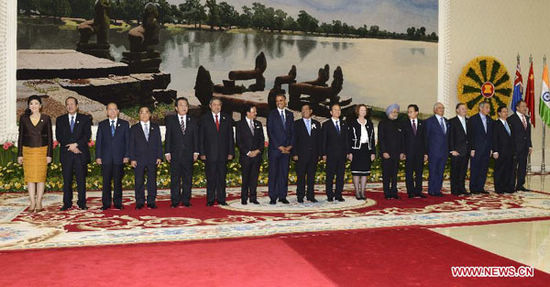
 |
| Chinese Premier Wen Jiabao and other leaders pose for a group photo before attending the seventh East Asia Summit in Phnom Penh, capital of Cambodia, Nov. 20, 2012. (Xinhua/Zhang Duo) |
PHNOM PENH, Nov. 20 (Xinhua) -- China will continue to be an important engine for the regional and global economies, Chinese Premier Wen Jiabao said at the seventh East Asia Summit (EAS) here on Tuesday.
The Chinese economy is becoming more stable and is expected to maintain relatively fast growth and develop at a higher level, Wen said.
The EAS members should make great efforts to do their own business well, and be all the more mindful of potential perils and responsibilities, make more powerful policies and measures to deal with the international financial crisis, stabilize finance, revive their economies, increase employment and improve the people's livelihood, he said.
These are the most direct and efficient ways to contribute to regional development, he said.
The international community is concerned about the slowing momentum of the global economic recovery, with growing factors of instability and uncertainty, Wen said.
The EAS is aimed at unity and cooperation, he said, noting its members should actively address the common concern of the international community and bring confidence and hope to the world.
The EAS should create a cooperative atmosphere in favor of dialogue, consultation and win-win results, he said.
The Asia-Pacific is characterized by outstanding diversity, with differences and problems between countries hard to avoid, he said, adding it is believed the countries concerned could properly deal with differences through dialogue.
China has always advocated mutual respect and understanding, and cementing peaceful relations by upholding good faith, he said, adding China is willing to continue to play a responsible role in peace, stability and development in East Asia.
China fully supports efforts of the Association of Southeast Asian Nations (ASEAN) to push forward the building of the Regional Comprehensive Economic Partnership (RCEP), Wen said.
The RCEP is of great significance as it reflects the consensus of the countries of the region and gives a clear direction for regional economic integration, he said.
Wen called on all countries to grasp new opportunities created by the regional integration process, pursue free and fair trade policies, stick to open markets and firmly oppose all forms of protectionism.
The 7th EAS opened here Tuesday with the presence of leaders from the 10 ASEAN member states and eight dialogue partners as well as the heads of several international financial institutions.
Negotiation on the RCEP will be officially launched at the end of the summit by leaders of the ASEAN nations and six key Asia Pacific countries: China, Australia, India, Japan, South Korea and New Zealand.

















 Landmark building should respect the public's feeling
Landmark building should respect the public's feeling


![]()
